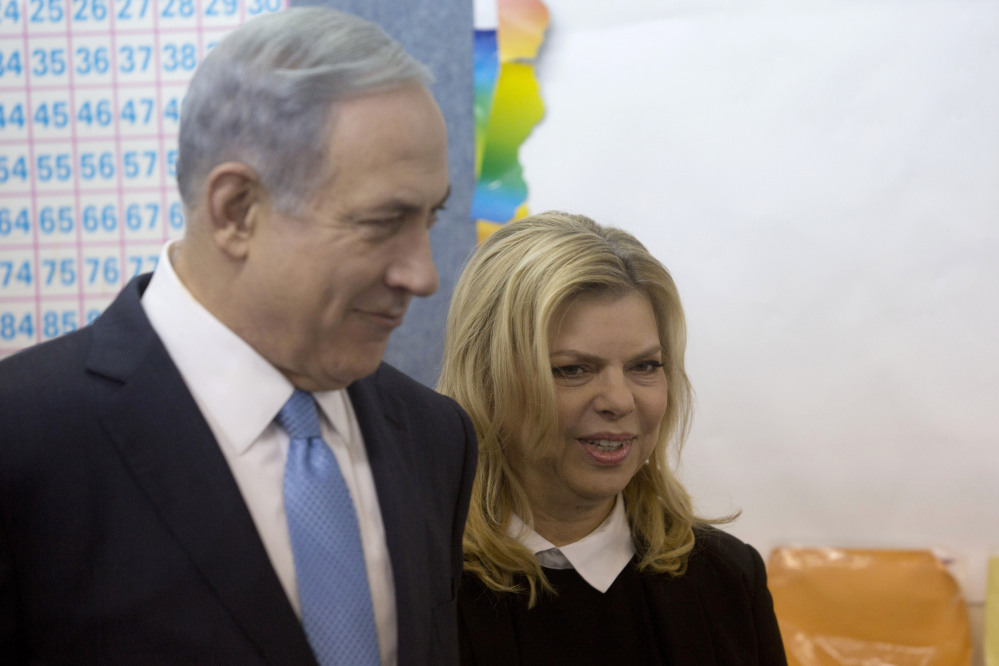JERUSALEM – Israeli Prime Minister Benjamin Netanyahu’s political survival was on the line Tuesday in a hard-fought parliamentary election pitting his nationalist and security-first ideology against his challengers’ focus on the plight of the country’s struggling middle class.
Opinion polls showed a tight race heading into Tuesday’s vote, with Netanyahu’s opponents, led by Isaac Herzog of the centrist Zionist Union, showing a slight lead. The last available poll was published Friday, when a significant number of voters were still undecided.
In a dramatic last-ditch effort to appeal to his right-wing base, Netanyahu reiterated his pledge Tuesday to prevent the establishment of a Palestinian state and took a swipe at Israel’s own Arab minority.
“Right wing rule is in danger. Arab voters are going to the polls in droves. Left wing organizations are bringing them in buses,” Netanyahu said in a video statement posted on his Facebook page.
He called on supporters to vote for him to “narrow the gap” between his party and the Zionist Union. “With your help, and with the help of God, we will build a nationalist government that will protect the state of Israel,” he said.
Herzog has promised to revive peace efforts with the Palestinians, repair ties with the United States and reduce the growing gaps between rich and poor.
“Whoever wants to follow (Netanyahu’s) path of despair and disappointment will vote for him,” Herzog said after casting his vote. “But whoever wants change, hope, and really a better future for Israel, will vote the Zionist Union led by me.”
That call resonated with 51-year-old Ofer Benishti, who voted at a polling station in Kfar Saba in central Israel. He said he was a lifelong Likud voter but was now casting his ballot for the Zionist Union.
“I have had enough,” said Benishti, a businessman whose company deals with spare parts for buses. “Bibi tried and tried and tried, but it just hasn’t worked. It’s time to give someone else a chance. It can’t get worse than this.”
Israeli election officials said 26.5 percent of eligible voters had voted by midday, a rate similar to previous years. Elections day is a public holiday in Israel – most people do not go to work, beaches and restaurants fill up, and stores advertise election-day sales.
Facebook featured a special “I voted” button in Hebrew, as it has during elections in other countries, in an effort to get out the vote.
In electing the 120-member parliament, Israelis are casting ballots for party lists, rather than individual candidates. No party has ever won a majority, and so after an election, it can take weeks of negotiations to form a governing coalition of parties.
Several smaller centrist and religious parties that have not pledged support for either Netanyahu or Herzog will likely tip the scales to determine who will become prime minister.
Netanyahu has governed for the past six years and has long been the most dominant personality in Israeli politics.
He has swung further to the right in the final stages of the campaign, complaining of an international conspiracy funded by wealthy foreigners to oust him, and warning of a “left-wing government supported by the Arabs,” referring to a list of mostly Israeli Arab politicians that according to polls could emerge as the third biggest party in Israel.
This election season has amplified the bitter divide between hard-liners and moderates in Israel.
Earlier this month, tens of thousands of Israelis rallied in a central square in Tel Aviv where a former head of Israel’s Mossad spy agency called for Netanyahu’s ouster. And on Sunday, tens of thousands of right-wing Israelis filled the same square to hear Netanyahu and nationalist politicians speak.
Netanyahu has appeared increasingly rattled, and after largely shunning the Israeli media for years, he gave a series of interviews to major Israeli television networks and small regional radio stations.
In a live phone interview on Israeli Channel 10 TV, Netanyahu ruled out a coalition with Herzog and said he would seek an alliance with the ultra-national Jewish Home party, which also opposes Palestinian statehood.
Netanyahu portrayed Herzog as someone who would easily give up territory for a Palestinian state. The Palestinians want to establish a state in the West Bank, Gaza Strip and east Jerusalem, lands Israel captured in the 1967 Mideast war.
“We have a different approach,” Netanyahu said. “They (the Zionist Union) want to withdraw. I don’t want to withdraw. If I put together the government, it will be a nationalist government.”
Netanyahu’s comments marked a political gamble.
For years, he assured the international community that he accepts the idea of Palestinian statehood and that he is ready to negotiate the terms of such a state. Netanyahu has portrayed Palestinian President Mahmoud Abbas as the main obstacle to a peace deal.
If Netanyahu were to be re-elected, it would be more difficult for him to argue that Israel is a partner in U.S.-led peace efforts. Washington views the establishment of a Palestinian state as a pillar of its Mideast policy – a position shared by other key western allies.
“The world needs to listen carefully to this statement and stop calling for talks with Netanyahu over the two-state solution if he is elected,” said Saleh Rafat, an aide to Abbas.
Herzog, meanwhile, signaled he may dissolve what had been perceived as an unpopular power-sharing deal with the co-leader of the Zionist Union, former Foreign Minister Tzipi Livni.
Under that deal, Herzog and Livni would each have served as prime minister for two years if they won the elections. Both have now indicated Herzog could serve a full term, and Livni said she would not allow the deal to stand in the way of a Herzog-led government.
Meanwhile, police said they arrested an Israeli soldier on suspicion of incitement of violence. The soldier wrote on Facebook that if a leftist were to rise to power, the soldier would follow in the footsteps of Israeli extremist Yigal Amir, who assassinated dovish Prime Minister Yitzhak Rabin in 1995.
Send questions/comments to the editors.




Success. Please wait for the page to reload. If the page does not reload within 5 seconds, please refresh the page.
Enter your email and password to access comments.
Hi, to comment on stories you must . This profile is in addition to your subscription and website login.
Already have a commenting profile? .
Invalid username/password.
Please check your email to confirm and complete your registration.
Only subscribers are eligible to post comments. Please subscribe or login first for digital access. Here’s why.
Use the form below to reset your password. When you've submitted your account email, we will send an email with a reset code.